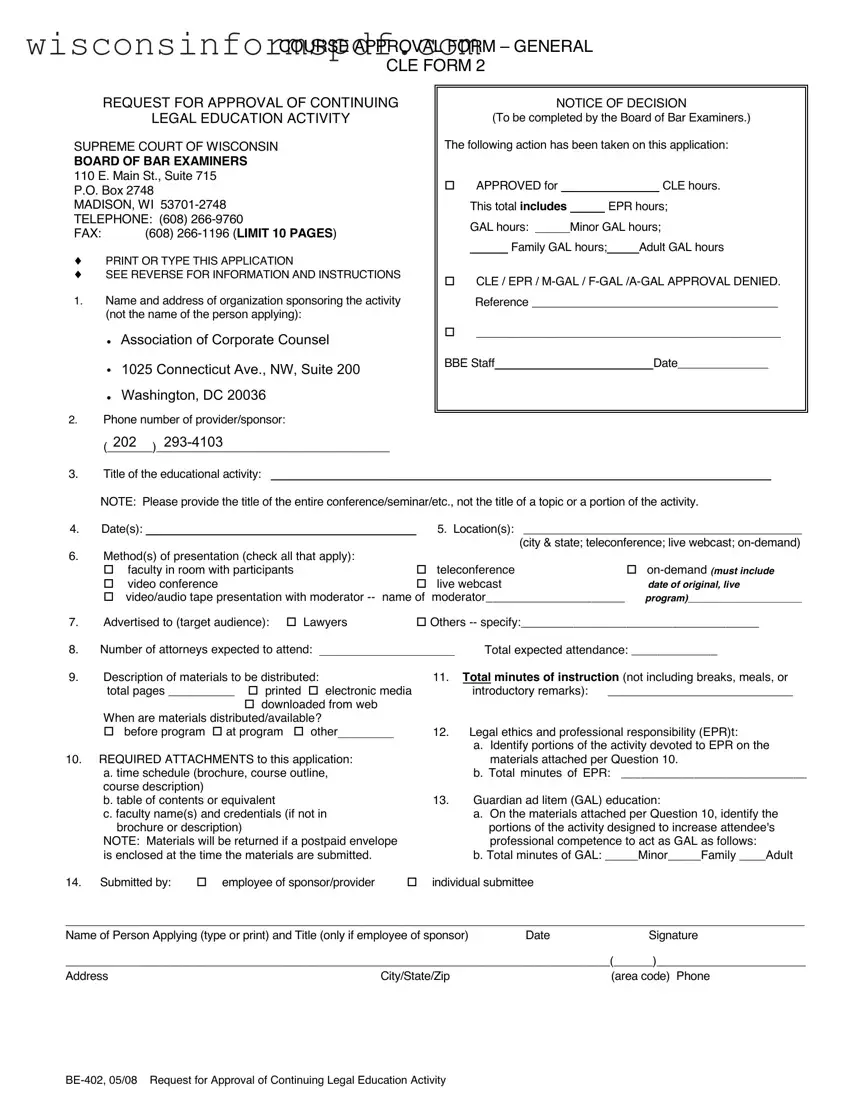COURSE APPROVAL FORM – GENERAL
CLE FORM 2
REQUEST FOR APPROVAL OF CONTINUING
LEGAL EDUCATION ACTIVITY
SUPREME COURT OF WISCONSIN
BOARD OF BAR EXAMINERS
110 E. Main St., Suite 715
P.O. Box 2748
MADISON, WI 53701-2748
TELEPHONE: (608) 266-9760
FAX: |
(608) 266-1196 (LIMIT 10 PAGES) |
♦PRINT OR TYPE THIS APPLICATION
♦SEE REVERSE FOR INFORMATION AND INSTRUCTIONS
1.Name and address of organization sponsoring the activity (not the name of the person applying):
•Association of Corporate Counsel
•1025 Connecticut Ave., NW, Suite 200
•Washington, DC 20036
2.Phone number of provider/sponsor:
202 293-4103 (_______)____________________________________
3.Title of the educational activity:
NOTICE OF DECISION
(To be completed by the Board of Bar Examiners.)
The following action has been taken on this application:
|
|
|
|
|
|
|
|
|
|
APPROVED for |
|
|
|
|
|
CLE hours. |
|
This total includes |
|
|
EPR hours; |
|
GAL hours: |
|
Minor GAL hours; |
|
|
Family GAL hours; |
|
Adult GAL hours |
CLE / EPR / M-GAL / F-GAL /A-GAL APPROVAL DENIED. Reference ______________________________________
_______________________________________________
BBE Staff |
|
Date______________ |
|
|
|
|
NOTE: Please provide the title of the entire conference/seminar/etc., not the title of a topic or a portion of the activity. |
4. |
Date(s): |
|
5. Location(s): ___________________________________________ |
|
|
|
(city & state; teleconference; live webcast; on-demand) |
6.Method(s) of presentation (check all that apply):
|
|
faculty in room with participants |
teleconference |
on-demand (must include |
|
|
video conference |
live webcast |
date of original, live |
|
video/audio tape presentation with moderator -- |
name of moderator_____________________ |
program)_____________________ |
7. |
Advertised to (target audience): Lawyers |
Others -- specify:____________________________________ |
8.Number of attorneys expected to attend:
9.Description of materials to be distributed:
total pages __________ printed electronic media
downloaded from web When are materials distributed/available?
before program at program other
10.REQUIRED ATTACHMENTS to this application:
a.time schedule (brochure, course outline, course description)
b.table of contents or equivalent
c.faculty name(s) and credentials (if not in
brochure or description)
NOTE: Materials will be returned if a postpaid envelope is enclosed at the time the materials are submitted.
Total expected attendance: _____________
11.Total minutes of instruction (not including breaks, meals, or introductory remarks): ____________________________
12.Legal ethics and professional responsibility (EPR)t:
a.Identify portions of the activity devoted to EPR on the materials attached per Question 10.
b.Total minutes of EPR: ____________________________
13.Guardian ad litem (GAL) education:
a.On the materials attached per Question 10, identify the portions of the activity designed to increase attendee's professional competence to act as GAL as follows:
b.Total minutes of GAL: _____Minor_____Family ____Adult
14. Submitted by: employee of sponsor/provider individual submittee
__________________________________________________________________________________________________________________
Name of Person Applying (type or print) and Title (only if employee of sponsor) DateSignature
____________________________________________________________________________________(______)_______________________
Address |
City/State/Zip |
(area code) Phone |
BE-402, 05/08 Request for Approval of Continuing Legal Education Activity
HOW TO SECURE APPROVAL OF A COURSE FOR USE TOWARD THE
WISCONSIN MANDATORY CONTINUING LEGAL EDUCATION (CLE) REQUIREMENT
The Wisconsin mandatory CLE requirement is administered by the Board of Bar Examiners, an agency of the Supreme Court of Wisconsin, with staff offices at Suite 715 Tenney Building; 110 East Main Street; Madison, WI 53703-3328. SCR Chapter 31 and duly adopted Board rules govern the Wisconsin CLE program. The information and instructions below are intended to guide completion of the CLE Course Approval Form – General (Form 2), not as substitutes for the rules themselves. Copies of SCR Chapter 31 and its Appendix are available at: www.wicourts.gov.
A course approval form should be completed for each activity to be considered by the Board for approval for use toward the CLE requirement. The form may be duplicated as needed. An approval decision is usually made within two weeks; it will take longer if the request is not complete, or if the course approval form is submitted during the CLE seasonal peak (November-January). Please note that course approval forms arriving at the Board office with Report of Compliance (CLE Form 1*) will be separated and processed independently.
In order to make an approval decision the following must be provided:
A timetable or agenda whereby a credit determination may be made. It should include a precise breakdown of the actual starting and ending times of the activity, including the starting and ending times of breaks, opening remarks, meals and keynote speeches.
A complete description of the written materials distributed to participants, or a copy thereof. (Materials will be returned if a postpaid envelope is enclosed.) If it is not clear whether all portions of the program were supported by written materials, an annotated agenda may be submitted.
An indication as to whom the activity was offered. If it is not apparent that the objective was legal education, or if it appears to be geared to a general audience, include a statement as to how it increased the competence of lawyers who attended.
Also, please note:
Fax submissions of requests for CLE credit must be limited to 10 pages or less.
As Wisconsin lawyers are obligated to satisfy a three-hour legal ethics and professional responsibility requirement biennially, it is necessary to clearly identify those programs, or portions of programs, lasting at least one continuous hour (50 minutes) on this topic.
Copies of SCR Chapter 35 and 36, which set forth education requirement for lawyers who accept appointments by a court as guardian ad litem for a minor or an adult, are available at www.wicourts.gov.
Lawyers who teach approved courses are entitled to double the number of hours approved for each portion taught.
Although sponsors are required by the rules governing the Wisconsin CLE requirement to maintain a list of Wisconsin lawyers attending approved activities and to transmit the list to the Board following the presentation of the course, the Board will accept certificates of attendance in lieu of a complete attendance list.
*The Board of Bar Examiners does not maintain a transcript of CLE courses attended by lawyers. In order to receive credit for attendance at approved activities for use toward the Wisconsin CLE requirement, individual lawyers must report their hours of actual attendance (not to exceed the amount approved) on a timely filed Report of Compliance (CLE Form 1). Wisconsin lawyers admitted in even-numbered years must file a CLE Form 1 evidencing compliance by December 31 every even-numbered year; Wisconsin lawyers admitted in odd-numbered years, by December 31 every odd-numbered year. CLE Form 1s are mailed from the Board of Bar Examiners approximately three months before the end of each attorney's reporting period.
BE-402, 05/08 Request for Approval of Continuing Legal Education Activity


